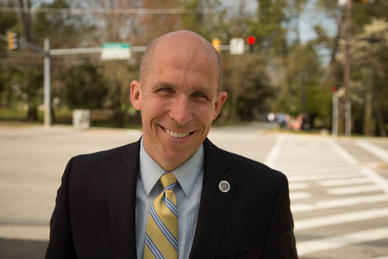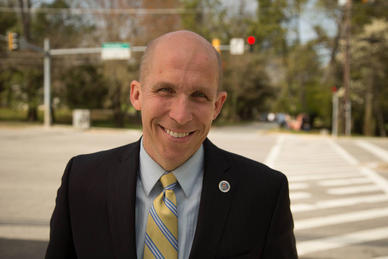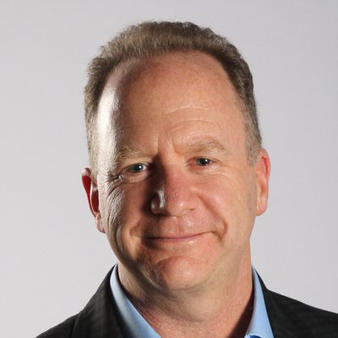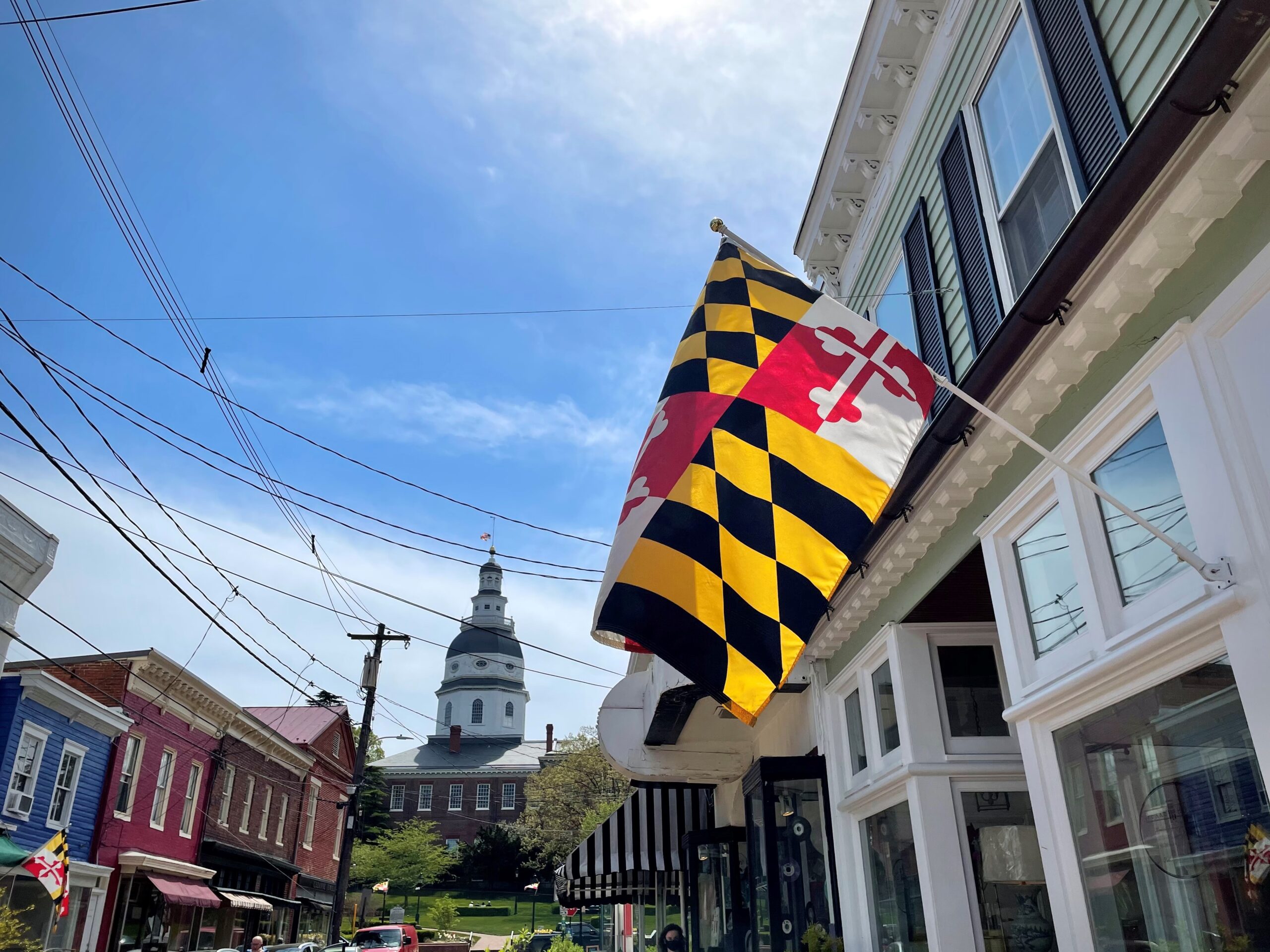Foe Hits Councilman Who Voted for Public Finance System But Rejects Public Funds

A member of the Montgomery County Council who voted for — but is not participating in — the county’s new public campaign financing system is being accused of hypocrisy by a rival.
Kevin Harris, a former planner for the Metropolitan Washington Council of Governments, is one of two Democrats challenging first-term incumbent Councilman Tom Hucker, who represents District 5, the Silver Spring area, in the June 26 Democratic primary.
In 2015, Hucker voted to put $11 million into the county’s new public financing system, and while serving in the House of Delegates he cosponsored bills to create public financing for state legislative campaigns. But his bid for a second term in Rockville is relying on traditional financing, outside the new, voluntary system.

Montgomery County Councilman Tom Hucker
“At a minimum it’s hypocritical,” Harris said. “It raises the issue of one’s integrity. And I think it raises the question of — when you say something — do you mean it?”
The county’s system, one of the first of its kind in the nation, is intended to reduce the role of developers and other corporate interests in local elections.
To qualify for matching funds, candidates must receive contributions of between $5 and $150 from at least 125 county residents.
“Our schools are over-crowded, our roads are congested, development is going unchecked,” Harris said. “And our current politicians, including Tom, are in the pocket of special interests and developers.”
Hucker rejects the accusation.
He notes that Harris and the third Democratic candidate, Kenge Malikidogo-Fludd, waited until the last minute to file, putting him in a bind because of the new system’s restrictions.
“Any money you’ve raised in the last three and a half years, you have to freeze and you can’t use,” he said. “That left me with not much time” to raise money.
Perhaps more to the point, Hucker said, “I have 500 small contributions from the community.”
Hucker has raised more than $200,000 since 2015. Harris has raised $52,000, including the matching funds he received from the public financing system. Malikidogo-Fludd has raised $2,000.
While Harris claims to be representing “the people’s interests, not the special interests,” it’s Hucker who has hoovered up virtually every progressive endorsement in the race. “I have a 100 percent progressive voting record,” he said. “And I’ve been endorsed by every single progressive group, including all the groups that stand up to developers.”
Hucker, the former head of Progressive Maryland and the founding director of its predecessor organization, Progressive Montgomery, has also been endorsed by three of the county’s most popular politicians, Executive Isiah Leggett, U.S. Sen. Chris Van Hollen and U.S. Rep. Jamie Raskin.

Kevin Harris
Still, Harris sees a sinister connection between Hucker’s campaign report and his votes. He said that provisions in the Silver Spring and Bethesda growth plans will result in developers paying less in impact fees and taxes.
“The [schools and transportation] issues that we’re confronting are not accidents,” he said. “They’re the result of poor planning, pay-to-play politics and poor decision-making.”
Hucker said he has consistently voted to make sure developers pony up for the infrastructure needs their projects require. He points to, among others, the White Oak Science Gateway project, a District 5 development.
The council voted to boost the transportation levy the developer will pay, from the $3,800-per-trip the executive proposed to $5,000-per-trip.
“What really matters is how you vote,” Hucker said. “Every time I’ve been able to vote on how much developers have to pay, I voted for more.”
Harris notes that Council members Marc B. Elrich and George L. Leventhal, who are running for executive, and Nancy Navarro, who is running for reelection unopposed, all faced the same choice as Hucker, and all opted for public financing.
Councilman Roger Berliner, who is also running for executive, chose not to accept public funds.
“Tom continued to feed at the trough of special interests because he could,” Harris said.
Bunk, Hucker said. “He doesn’t have a case.”
Hucker, who held a 2017 fundraiser at the home of Potomac mega-donor Aris Martarisian, said he’s taken “one or two” check from developers.
But Harris combed the incumbent’s campaign finance reports and has a different take: “From 2015 to today, he’s accepted over $70,000 from developers, real estate interests and corporate interests. That’s 41 percent of his fundraising.”
Former Council member Phil Andrews, the architect of Montgomery’s public financing system, refused to directly criticize Hucker.
“One could say if you support it, you should use it yourself,” he said. “Obviously it’s a voluntary system.”
The system is designed to encourage candidates to get many small donations, to avoid the appearance (or reality) of undue influence – what critics call “pay to play,” which can occur when corporate interests provide the bulk of a candidate’s funds.
Under Montgomery’s system, the first $50 that a candidate raises from a donor is matched four-to-one. The next $50 is matched three-to-one. And the third $50 is matched two-to-one. So a candidate can generate a total of $600 from each $150 contributor. Donors must reside in Montgomery for the candidate to qualify.
Hucker said he is proud of the money that is flowing to his district due to his work on the council. He points to hundreds of millions of dollars for school construction, bus rapid transit, Metro station improvements and pedestrian safety upgrades.
He also points to the work he’s done to help young people train for “green infrastructure” jobs.
If he wins a second term, Hucker said he hopes to install a new program, which the state has already authorized, to allow the county to use its low-interest bonding authority to help college graduates pay down their student loan debts more affordably.
Noting that the council will likely have many new faces after November’s elections, Hucker believes the district would benefit from having a seasoned hand in Rockville over the next four years.
I’m not one of the folks who believes that you believe you can just walk in off the street, with no experience in government, and succeed,” he said.




 Creative Commons Attribution
Creative Commons Attribution